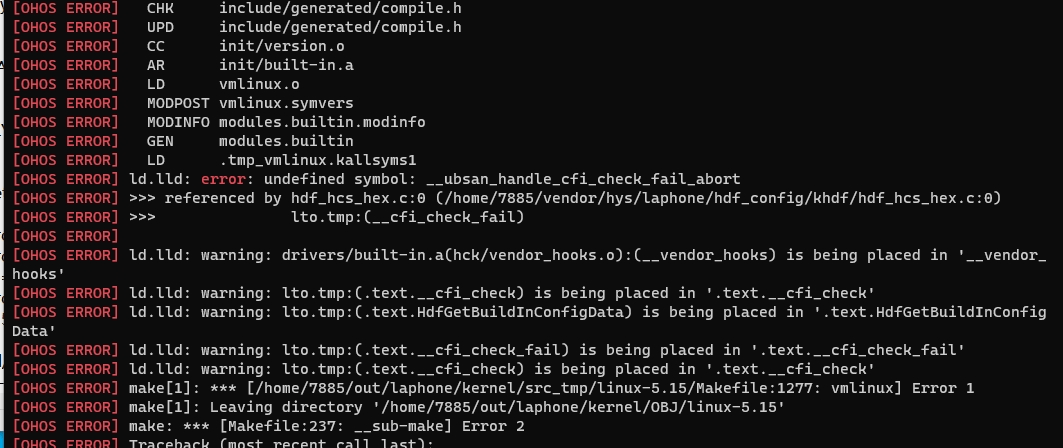开发者手机4.0release kasan版本编译
开发者手机4.0release kasan版本编译 一、修改内核配置文件: 路径:kernel\linux\linux-5.15\arch\arm64\configs\laphone_defconfig 1、stack_depot_disable=on 打开,否则缓存堆栈不可用,导致打印缓存调用栈失败 CONFIG_CMDLINE&a
开发者手机4.0release kasan版本编译
一、修改内核配置文件:
路径:kernel\linux\linux-5.15\arch\arm64\configs\laphone_defconfig
1、stack_depot_disable=off 打开,否则缓存堆栈不可用,导致打印缓存调用栈失败
CONFIG_CMDLINE="stack_depot_disable=off kasan.stacktrace=off kvm-arm.mode=protected cgroup_disable=pressure"
2、CONFIG_FRAME_WARN=0 //关闭堆栈大小设置,否则会导致编译不通过
3、开启kasan通用堆栈设置,关闭其他选项
CONFIG_HAVE_ARCH_KASAN=y
#CONFIG_HAVE_ARCH_KASAN_SW_TAGS=y
#CONFIG_HAVE_ARCH_KASAN_HW_TAGS=y
#CONFIG_HAVE_ARCH_KASAN_VMALLOC=y
CONFIG_CC_HAS_KASAN_GENERIC=y
#CONFIG_CC_HAS_KASAN_SW_TAGS=y
CONFIG_CC_HAS_WORKING_NOSANITIZE_ADDRESS=y
CONFIG_KASAN=y
CONFIG_KASAN_GENERIC=y
CONFIG_SECTION_MISMATCH_WARN_ONLY=y
# CONFIG_KASAN_SW_TAGS is not set
# CONFIG_KASAN_HW_TAGS=y
# CONFIG_KASAN_TAGS_IDENTIFY is not set
# CONFIG_KASAN_VMALLOC=y
二、kasan 测试样例添加
1、添加测试样例代码
路径:kernel\linux\linux-5.15\arch\arm64\mm\ 目录下添加测试样例kasan_test.c 文件
#define pr_fmt(fmt) "kasan test: %s " fmt, __func__
#include <linux/kernel.h>
#include <linux/mman.h>
#include <linux/mm.h>
#include <linux/printk.h>
#include <linux/slab.h>
#include <linux/string.h>
#include <linux/uaccess.h>
#include <linux/module.h>
#include <linux/kasan.h>
static noinline void __init kmalloc_oob_right(void)
{
char *ptr;
size_t size = 123;
pr_info("out-of-bounds to right\n");
ptr = kmalloc(size, GFP_KERNEL);
if (!ptr) {
pr_err("Allocation failed\n");
return;
}
ptr[size] = 'x';
kfree(ptr);
}
static noinline void __init kmalloc_oob_left(void)
{
char *ptr;
size_t size = 15;
pr_info("out-of-bounds to left\n");
ptr = kmalloc(size, GFP_KERNEL);
if (!ptr) {
pr_err("Allocation failed\n");
return;
}
*ptr = *(ptr - 1);
kfree(ptr);
}
static noinline void __init kmalloc_node_oob_right(void)
{
char *ptr;
size_t size = 4096;
pr_info("kmalloc_node(): out-of-bounds to right\n");
ptr = kmalloc_node(size, GFP_KERNEL, 0);
if (!ptr) {
pr_err("Allocation failed\n");
return;
}
ptr[size] = 0;
kfree(ptr);
}
#ifdef CONFIG_SLUB
static noinline void __init kmalloc_pagealloc_oob_right(void)
{
char *ptr;
size_t size = KMALLOC_MAX_CACHE_SIZE + 10;
/* Allocate a chunk that does not fit into a SLUB cache to trigger
* the page allocator fallback.
*/
pr_info("kmalloc pagealloc allocation: out-of-bounds to right\n");
ptr = kmalloc(size, GFP_KERNEL);
if (!ptr) {
pr_err("Allocation failed\n");
return;
}
ptr[size] = 0;
kfree(ptr);
}
#endif
static noinline void __init kmalloc_large_oob_right(void)
{
char *ptr;
size_t size = KMALLOC_MAX_CACHE_SIZE - 256;
/* Allocate a chunk that is large enough, but still fits into a slab
* and does not trigger the page allocator fallback in SLUB.
*/
pr_info("kmalloc large allocation: out-of-bounds to right\n");
ptr = kmalloc(size, GFP_KERNEL);
if (!ptr) {
pr_err("Allocation failed\n");
return;
}
ptr[size] = 0;
kfree(ptr);
}
static noinline void __init kmalloc_oob_krealloc_more(void)
{
char *ptr1, *ptr2;
size_t size1 = 17;
size_t size2 = 19;
pr_info("out-of-bounds after krealloc more\n");
ptr1 = kmalloc(size1, GFP_KERNEL);
ptr2 = krealloc(ptr1, size2, GFP_KERNEL);
if (!ptr1 || !ptr2) {
pr_err("Allocation failed\n");
kfree(ptr1);
return;
}
ptr2[size2] = 'x';
kfree(ptr2);
}
static noinline void __init kmalloc_oob_krealloc_less(void)
{
char *ptr1, *ptr2;
size_t size1 = 17;
size_t size2 = 15;
pr_info("out-of-bounds after krealloc less\n");
ptr1 = kmalloc(size1, GFP_KERNEL);
ptr2 = krealloc(ptr1, size2, GFP_KERNEL);
if (!ptr1 || !ptr2) {
pr_err("Allocation failed\n");
kfree(ptr1);
return;
}
ptr2[size2] = 'x';
kfree(ptr2);
}
static noinline void __init kmalloc_oob_16(void)
{
struct {
u64 words[2];
} *ptr1, *ptr2;
pr_info("kmalloc out-of-bounds for 16-bytes access\n");
ptr1 = kmalloc(sizeof(*ptr1) - 3, GFP_KERNEL);
ptr2 = kmalloc(sizeof(*ptr2), GFP_KERNEL);
if (!ptr1 || !ptr2) {
pr_err("Allocation failed\n");
kfree(ptr1);
kfree(ptr2);
return;
}
*ptr1 = *ptr2;
kfree(ptr1);
kfree(ptr2);
}
static noinline void __init kmalloc_oob_memset_2(void)
{
char *ptr;
size_t size = 8;
pr_info("out-of-bounds in memset2\n");
ptr = kmalloc(size, GFP_KERNEL);
if (!ptr) {
pr_err("Allocation failed\n");
return;
}
memset(ptr+7, 0, 2);
kfree(ptr);
}
static noinline void __init kmalloc_oob_memset_4(void)
{
char *ptr;
size_t size = 8;
pr_info("out-of-bounds in memset4\n");
ptr = kmalloc(size, GFP_KERNEL);
if (!ptr) {
pr_err("Allocation failed\n");
return;
}
memset(ptr+5, 0, 4);
kfree(ptr);
}
static noinline void __init kmalloc_oob_memset_8(void)
{
char *ptr;
size_t size = 8;
pr_info("out-of-bounds in memset8\n");
ptr = kmalloc(size, GFP_KERNEL);
if (!ptr) {
pr_err("Allocation failed\n");
return;
}
memset(ptr+1, 0, 8);
kfree(ptr);
}
static noinline void __init kmalloc_oob_memset_16(void)
{
char *ptr;
size_t size = 16;
pr_info("out-of-bounds in memset16\n");
ptr = kmalloc(size, GFP_KERNEL);
if (!ptr) {
pr_err("Allocation failed\n");
return;
}
memset(ptr+1, 0, 16);
kfree(ptr);
}
static noinline void __init kmalloc_oob_in_memset(void)
{
char *ptr;
size_t size = 666;
pr_info("out-of-bounds in memset\n");
ptr = kmalloc(size, GFP_KERNEL);
if (!ptr) {
pr_err("Allocation failed\n");
return;
}
memset(ptr, 0, size+5);
kfree(ptr);
}
static noinline void __init kmalloc_uaf(void)
{
char *ptr;
size_t size = 10;
pr_info("use-after-free\n");
ptr = kmalloc(size, GFP_KERNEL);
if (!ptr) {
pr_err("Allocation failed\n");
return;
}
kfree(ptr);
*(ptr + 8) = 'x';
}
static noinline void __init kmalloc_uaf_memset(void)
{
char *ptr;
size_t size = 33;
pr_info("use-after-free in memset\n");
ptr = kmalloc(size, GFP_KERNEL);
if (!ptr) {
pr_err("Allocation failed\n");
return;
}
kfree(ptr);
memset(ptr, 0, size);
}
static noinline void __init kmalloc_double_free_test(void)
{
char *ptr;
size_t size = 123;
pr_info("double-free\n");
ptr = kmalloc(size, GFP_KERNEL);
if (!ptr) {
pr_err("Allocation failed\n");
return;
}
kfree(ptr);
kfree(ptr);
}
static int __init kmalloc_tests_init(void)
{
/*
* Temporarily enable multi-shot mode. Otherwise, we'd only get a
* report for the first case.
*/
kmalloc_oob_right();
kmalloc_oob_left();
kmalloc_node_oob_right();
#ifdef CONFIG_SLUB
kmalloc_pagealloc_oob_right();
#endif
kmalloc_large_oob_right();
kmalloc_oob_krealloc_more();
kmalloc_oob_krealloc_less();
kmalloc_oob_16();
kmalloc_oob_in_memset();
kmalloc_oob_memset_2();
kmalloc_oob_memset_4();
kmalloc_oob_memset_8();
kmalloc_oob_memset_16();
kmalloc_uaf();
kmalloc_uaf_memset();
kmalloc_double_free_test();
return -EAGAIN;
}
module_init(kmalloc_tests_init);
MODULE_LICENSE("GPL");
2、测试用例编译添加
路径:kernel\linux\linux-5.15\arch\arm64\mm\Makefile 中添加obj-$(CONFIG_KASAN) += kasan_init.o kasan_test.o
obj-$(CONFIG_KASAN) += kasan_init.o kasan_test.o3、kasan_init.c中添加多次故障检测
路径:kernel\linux\linux-5.15\arch\arm64\mm\kasan_init.c
kasan_init() 函数中添加 kasan_save_enable_multi_shot(); 目的:可以检测到多次内存问题,不添加仅能检测首次。
void __init kasan_init(void)
{
kasan_init_shadow();
kasan_init_depth();
kasan_save_enable_multi_shot();
#if defined(CONFIG_KASAN_GENERIC)
/* CONFIG_KASAN_SW_TAGS also requires kasan_init_sw_tags(). */
pr_info("KernelAddressSanitizer initialized (generic)\n");
#endif
}4、修改缓存堆栈打印函数
路径:kernel\linux\linux-5.15\kernel\stacktrace.c
stack_trace_print()函数中printk 改为pr_err ,原因为系统默认日志级别为4导致printk无法打印堆栈。
void stack_trace_print(const unsigned long *entries, unsigned int nr_entries,
int spaces)
{
unsigned int i;
if (WARN_ON(!entries))
return;
for (i = 0; i < nr_entries; i++)
// printk("%*c%pS\n", 1 + spaces, ' ', (void *)entries[i]);
pr_err("%*c%pS\n", 1 + spaces, ' ', (void *)entries[i]);
}三、修改编译问题
1、编译问题1:
说明:4.1release 版本代码修改后该问题不存在了,无需修改。

路径:kernel\linux\common_modules\xpm\core\xpm_hck.c
xpm_register_xpm_hooks()函数添加__init修饰符 。
__init void xpm_register_xpm_hooks(void)
{
security_add_hooks(xpm_hooks, ARRAY_SIZE(xpm_hooks), "xpm");
}2、编译问题2:

移除out/laphone目录下kernel 文件夹,执行 touch device/board/hys/laphone/kernel/build_kernel.sh 然后编译。
四、 修改烧录配置文件,解决烧录失败问题
路径:device\board\hys\laphone\pac\ImageFiles\uis7885_2h10.xml 中将updater_a 的值由64改为100
开发者手机二代还需将 boot_a的值由64改为100
五、kasan故障日志分析
见:OpenHarmony_3.2Release_编译Kasan版本指导_zhengxiaobo131202-Laval社区 (csdn.net) 文章中的故障日志分析。
更多推荐
 已为社区贡献13条内容
已为社区贡献13条内容







所有评论(0)